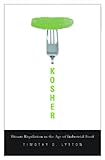Kosher : private regulation in the age of industrial food / Timothy D. Lytton.
Material type: TextPublication details: Cambridge, Massachusetts : Harvard University Press, 2013.Description: 1 online resource (viii, 232 pages) : illustrationsContent type:
TextPublication details: Cambridge, Massachusetts : Harvard University Press, 2013.Description: 1 online resource (viii, 232 pages) : illustrationsContent type: - 9780674075238
- 0674075234
- Kosher food industry -- United States
- Kosher food industry -- Standards -- United States
- Aliments casher -- Industrie -- États-Unis
- Aliments casher -- Industrie -- Normes -- États-Unis
- BUSINESS & ECONOMICS -- Industries -- Service
- RELIGION -- Judaism -- Rituals & Practice
- Kosher food industry
- United States
- 338.4/766100882960973 23
- HD9005 .L98 2013eb
- online - EBSCO
| Item type | Current library | Call number | URL | Status | Notes | Barcode | |
|---|---|---|---|---|---|---|---|
 eBook
eBook
|
Biblioteca "Angelicum" Pont. Univ. S.Tommaso d'Aquino Nuvola online | online - EBSCO (Browse shelf(Opens below)) | Online access | Not for loan (Accesso limitato) | Accesso per gli utenti autorizzati / Access for authorized users | (ebsco)520794 |
Includes bibliographical references and index.
Introduction: why kosher food certification is worthy of attention -- Rivalry and racketeering: the failures of kosher meat supervision 1850-1940 -- From canned soup to packaged nuts: the rise of industrial kashrus -- Sour grapes and self-regulation: creating an American standard of kashrus -- Taking stock: the effectiveness and integrity of the American industrial kashrus system -- Conclusion: industrial kashrus as a model of private third-party certification.
Print version record.
Generating over 2 billion in annual sales, kosher food is big business. It is also an unheralded story of successful private-sector regulation in an era of growing public concern over the government's ability to ensure food safety. Kosher uncovers how independent certification agencies rescued American kosher supervision from fraud and corruption and turned it into a model of nongovernmental administration. Currently, a network of over three hundred private certifiers ensures the kosher status of food for over twelve million Americans, of whom only eight percent are religious Jews. But the system was not always so reliable. At the turn of the twentieth century, kosher meat production in the United States was notorious for scandals involving price-fixing, racketeering, and even murder. Reform finally came with the rise of independent kosher certification agencies which established uniform industry standards, rigorous professional training, and institutional checks and balances to prevent mistakes and misconduct. In overcoming many of the problems of insufficient resources and weak enforcement that hamper the government, private kosher certification holds important lessons for improving food regulation, Timothy Lytton argues. He views the popularity of kosher food as a response to a more general cultural anxiety about industrialization of the food supply. Like organic and locavore enthusiasts, a growing number of consumers see in rabbinic supervision a way to personalize today's vastly complex, globalized system of food production.


